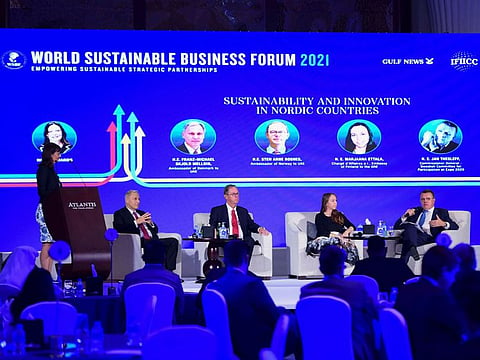Video - World Sustainable Business Forum in Dubai: ‘Welfare state’ model behind high performing Nordic countries
Adapting to ‘shifting tides’ in economic conditions critical to success, diplomat says

Dubai: The welfare state model can in “many ways” perhaps explain some of the key performance the Nordic countries are showing in global rankings, said Marjaana Ettala, Chargé d’Affaires a.i., Embassy of Finland to the UAE.
“The high value we place on ... innovation, transparency, accountability, also social fairness and equality, focused on well being, where well-being is often associated with the well being of one’s living environment as well,” said Ettala, during the World Sustainable Business Forum (WSBF) on Monday.
The WSBF, which is being held in Dubai, has brought together business and government leaders who are committed to innovating and creating positive change in the region and beyond.
This exclusive closed-door event — a joint initiative by Gulf News, the leading English-language news source in the UAE, and IFIICC, a global organisation committed to empowering trusted sustainable strategic partnerships — will discuss issues and topics that are shaping the national, regional and global sustainability landscape.
Advice for UAE firms
The pandemic has changed the way business is being conducted all over the world and particularly UAE. The most important thing is adapting “to the shifting tides of economic conditions that are one of the things that we’ve been good at in the Nordic countries,” said Franz-Michael Skjold Mellbin, Ambassador of Denmark to UAE.
In Denmark and other Nordic countries, “there is a tradition to try to adjust the business environment and societal environment before you run into the next large crisis,” said Melbin. “There was a high degree of investments going on in the companies towards research (and) development because people anticipate a secure investment to eventually pay off.”
A “high” degree of innovation and being able to deliver world class products and services makes companies more robust, said Melbin.
IKEA and sustainability
Swedish retailer giant IKEA not only put the country on the map, but has also set a fine example in the domain of sustainability.
IKEA has “eliminated the middleman as much as they can — you buy it, you assemble it and you live with it, and thereby you also reduce the carbon footprint of your business,” said Jan Thesleff, Commissioner General, Swedish Committee for Participation at Expo 2020.
Thesleff sees the COVID-19 pandemic as something that is here to stay for a while. “In March last year, the pandemic was new. And some people said in June or July, things will go back to what it was before,” said Thesleff. “We can all agree that it will not go back to what it was before”
However, the Swedish official believes that the crisis has taught governments and businesses many “horrible” lessons, which will better prepare them for the future.
Need for transparency
Sten Arne Rosnes, Ambassador of Norway to UAE, believes investing in companies and influencing their decision-making could be key to boosting sustainability.
Norway’s sovereign wealth fund is one of the largest in the world and has investments across different sectors around the globe. “Globally, the two main principles are transparency and active management,” said Rosnes. Through “active management, you have the possibility to influence some of the companies that you are buying into because it’s equities”.
“If you look at Norway, we have been in the forefront of innovation, especially when it comes to the maritime sector and energy, and electrification has been a very important part of that,” said Rosnes.
The Norwegian Ambassador said that the Scandinavian country can cooperate with Dubai and Abu Dhabi-based companies in the maritime and energy sectors. He also highlighted the role played by ‘Innovation Norway’ — the commercial section of the Norwegian Embassy in Abu Dhabi — in finding business partners for Norwegian and Emirati firms. “Electrification is maybe one of the interesting areas for many companies, and the energy sector is going to have a profound transformation,” said Rosnes.
Sign up for the Daily Briefing
Get the latest news and updates straight to your inbox








